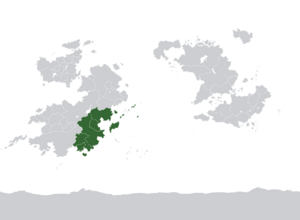Southeast Coius: Difference between revisions
Jump to navigation
Jump to search
No edit summary |
No edit summary |
||
| Line 21: | Line 21: | ||
|list_countries = | |list_countries = | ||
|dependencies = {{ubl | |dependencies = {{ubl | ||
|{{flagicon_image|Estmere.png}} [[Kingsport]] | |||
|{{flagicon_image|Flag_of_the_Brabantine_Revolution.svg}} [[Nouvel Anglet]] | |{{flagicon_image|Flag_of_the_Brabantine_Revolution.svg}} [[Nouvel Anglet]] | ||
}} | }} | ||
|unrecognized = {{flagicon_image|Flag_of_heijiang3.png}} [[Heijiang]] | |unrecognized = {{flagicon_image|Flag_of_heijiang3.png}} [[Heijiang]] | ||
Revision as of 11:13, 12 January 2020
 | |
| Area | 8,250,000 square kilometres |
|---|---|
| Population | 371,816,527 |
| Population density | 45/km2 |
| Religions | Badi, Irfan, Satyism, Solarian Catholicism |
| Demonym | Southeast Coian |
| Countries | |
| Dependencies | |
| Unrecognised states | |
| Languages | Brumhese, Estmerish, Gaullica, Kunak, Tinzan, Xiaodongese, Yirō, Ziba |
Southeast Coius is a region of the continent Coius, located in its southeast. It has x countries in it, with a population of x, and a wide variety of languages and religions, both indigenous and non-indigenous; these include Brumhese, Estmerish, Kunak, Tinzan, Yirō and Ziba, and Badi, Irfan, Satyism and Solarian Catholicism respectively. It is comprised primarily of developing countries with a history of colonialism; most of the region was Estmerish, Gaullican or Weranian at some time, but it mostly became independent after the Great War.
Countries
someone do a table